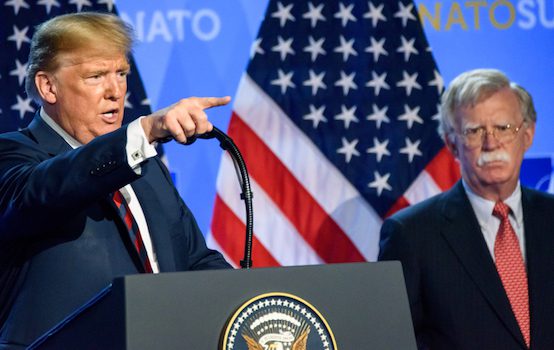Maximalism Is the Death of Diplomacy

U.S. special envoy Stephen Biegun repeated the administration’s line on North Korean disarmament today:
In his first public comments since President Donald Trump and North Korean leader Kim Jong Un met in Vietnam last month, Stephen Biegun, the US special representative for North Korea, told a Washington audience Monday that the administration wants Pyongyang to give up all of its weapons of mass destruction before anything else.
“We are not going to do denuclearization incrementally,” the envoy said at the Carnegie Endowment for International Peace’s nuclear conference. “The foundation of US policy is denuclearization.”
But it’s not just nuclear weapons: The Trump administration also wants the complete removal of chemical and biological weapons from North Korea, Biegun said, meaning the US wants Pyongyang only to have conventional weapons by the end of the process.
Biegun’s public remarks are the latest confirmation that the administration is taking the most hard-line negotiating position available. In the wake of the failed Hanoi summit, U.S. officials have been united in their insistence on making demands that have already been rejected and will never be accepted. The Trump administration’s maximalism has always been antithetical to making any real diplomatic progress, and as long as they cling to their unreasonable wish list the negotiations with North Korea won’t be going anywhere. That is what Bolton wants, but it puts Biegun in the ridiculous position of pretending that diplomacy with North Korea isn’t dead while reciting the demands that have already killed it.
The contrast between the Trump administration’s inflexibility and their predecessors’ willingness to make reasonable compromises to reach an agreement is impossible to miss. The fact that Biegun apparently feels obliged to endorse the president’s irrational hostility to the nuclear deal with Iran reflects that inflexibility:
Biegun: JCPOA failed because it focused narrowly on the nuclear issue. We’re focusing on the big picture covering all issues. https://t.co/XJ9dsBi3vZ
— (((James Acton))) (@james_acton32) March 11, 2019
Trashing the JCPOA is a standard hawkish talking point, but in the context of talking about nuclear negotiations with North Korea it is even more absurd than usual. The nuclear deal with Iran succeeded as a nonproliferation agreement precisely because it was focused only on the nuclear issue and because its negotiators were willing to compromise and not chase after unrealistic goals. Iran hawks always wanted the Obama administration to stick with a demand for “zero enrichment” in Iran, but U.S. negotiators figured out quickly enough that if they refused to budge on that point the talks would fall apart. It was only because the U.S. and the rest of the P5+1 backed off the initial demand that Iran give up all enrichment that Iran was prepared to make the concessions that made the deal a success.
If we applied that approach to the North Korean case, it would mean backing off demands for full disarmament and leaving non-nuclear issues for another day. Unfortunately, the administration has boxed itself in with its all-or-nothing approach and its expansive list of conditions. They refuse to learn anything from the successes of the JCPOA because the president and Bolton are committed to the lie that the deal was a bad one, and so they set themselves up to fail again and again.
Comments